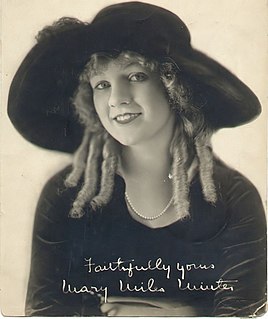
Mary Miles Minter was an American actress. She appeared in 53 silent films from 1912 to 1923.

Carl Stockdale also known as Carlton Stockdale was one of the longest-working Hollywood veteran actors, with a career dating from the early 1910s. He also made the difficult transition from silent films to talkies.
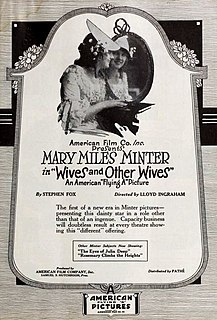
Wives and Other Wives is a 1918 American silent comedy-drama film directed by Lloyd Ingraham and starring Mary Miles Minter, based on a story by Jules Furthman. As with many of Minter's features, it is thought to be a lost film.

Andrew Arbuckle was an American stage and film actor. He was the brother of Macklyn Arbuckle and cousin of Roscoe "Fatty" Arbuckle.

Melissa of the Hills is a 1917 American silent film directed by James Kirkwood and starring Mary Miles Minter. As is the case with many of Minter's features, it is thought to be a lost film.

Periwinkle is a 1917 American silent film directed by James Kirkwood and starring Mary Miles Minter. It was based on a story written by William Farquhar Payson. As with many of Minter's features, it is thought to be a lost film.

Environment is a 1917 American silent drama film directed by James Kirkwood and starring Mary Miles Minter. As with many of Minter's features, it is believed to be a lost film. It is one of ten Minter films to also feature her older sister Margaret Shelby in a supporting role.

Charity Castle is a 1917 American silent comedy-drama film directed by Lloyd Ingraham and starring Mary Miles Minter. As is the case with many of Minter's features, it is thought to be a lost film.

Her Country's Call is a 1917 American silent drama film directed by Lloyd Ingraham and starring Mary Miles Minter, along with George Periolat and Allan Forrest. The film is the final instalment in a series a films written by Abraham Lincoln impersonator Benjamin Chapin, who also appeared in the film as Lincoln. It was one of many films of the time that catered to the vogue for patriotic pictures after America joined World War 1, with ample shots of soldiers and the American flag. As with many of Minter's features, it is thought to be a lost film.

The Mate of the Sally Ann is a 1917 American silent comedy-drama film directed by Henry King and starring Mary Miles Minter. As with many of Minter's features, it is thought to be a lost film.

Beauty and the Rogue is a 1918 American silent comedy crime drama film directed by Henry King and starring Mary Miles Minter. It was filmed under the working title of "Mademoiselle Tiptoe," based on a story by Arthur Berthelet and adapted for the screen by Elizabeth Mahoney, who was the screenwriter for many of Minter's Mutual Film features. As with many of Minter's features, it is thought to be a lost film.
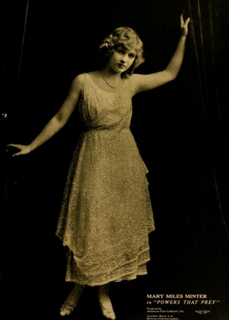
Powers That Prey is a 1918 silent comedy-drama film directed by Henry King and starring Mary Miles Minter, with whom King stated that he enjoyed working. The film is based on a story called Extra! Extra! by Will M. Ritchey, which was also the working title of the film. As with many of Minter's features, it is thought to be a lost film.
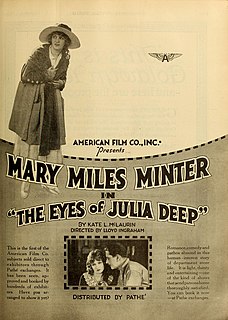
The Eyes of Julia Deep is a 1918 American silent comedy-drama film starring Mary Miles Minter and directed by Lloyd Ingraham. The film is based on the short story by the same name, written by Kate L. McLaurin. It is one of the few films starring Minter which are known to have survived, and one of even fewer readily available for the general public to view.

Social Briars is a 1918 American silent comedy-drama film directed by Henry King and starring Mary Miles Minter. The story was by Jeanne Judson, and it was filmed under the working title of "The Greater Call." As with many of Minter's features, it is thought to be a lost film.

The Amazing Impostor is a 1919 American silent comedy film starring Mary Miles Minter and directed by Lloyd Ingraham. As with many of Minter's features, it is thought to be a lost film.

Jenny Be Good is a is a 1920 American silent drama film directed by William Desmond Taylor and starring Mary Miles Minter, based on a novel by William Finley Fauley and adapted for the screen by Julia Crawford Ivers. It is the last of Minter's films to also feature her older sister Margaret Shelby in a supporting role. As with many of Minter's features, it is believed to be a lost film.

Rosemary Climbs the Heights is a 1918 American silent drama film directed by Lloyd Ingraham and starring Mary Miles Minter, Allan Forrest and Margaret Shelby. It is the only one of Minter's feature films not listed in the Library of Congress American Silent Feature Film Database, making its survival status difficult to ascertain.

Yvonne from Paris is a 1919 American silent comedy film directed by Emmett J. Flynn and starring Mary Miles Minter, Allan Forrest and Vera Lewis. It was Minter's last film with the American Film Company; she signed a contract with Realart, part of Famous Players-Lasky, in June 1919. As with many of Minter's features, it is thought to be a lost film.
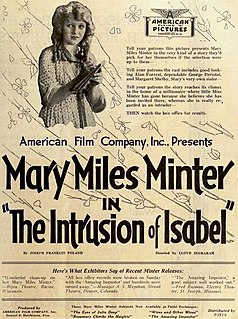
The Intrusion of Isabel is a 1919 American silent comedy film directed by Lloyd Ingraham and starring Mary Miles Minter, J. Parks Jones, Allan Forrest and Lucretia Harris. As with many of Minter's features, it is thought to be a lost film.

The Ghost of Rosy Taylor is a 1918 American silent comedy-drama film starring Mary Miles Minter and directed by Edward Sloman. The film is based on a Saturday Evening Post story of the same name, written by Josephine Daskam Bacon. It is one of approximately a dozen Minter films which are known to have survived - a print was found in New Zealand in the 1990s which is in possession of the BFI National Archive - and one of even fewer readily available for the general public to view.





















